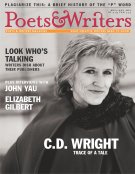Look Who's Talking
Some authors who have been through what Daniel Quinn calls "the
big-house blues" don't want to go back. Quinn received six-figure
advances for each of three novels. "The first time I got a high
six-digit advance, I thought, 'Wow, they're really going to get behind
this book when it comes out!'" But it wasn't so. And Quinn's is a story
I heard over and over in researching this article.
A lack of accountability seems to be the most consistently stated problem. It starts with the fact that the editor who contracts the book is not responsible for its marketing. And the marketing department, which didn't choose the book or pay the advance, doesn't operate as if it is obliged to earn that advance back. And then there is the sales force, which is asked to wax enthusiastic about hundreds of books instead of just a handful.
Quinn says he watched his novel The Story of B get shoved out into the market to sink or swim like all the rest. "That's the deal you make with the conglomerates—lots of money up front, no real support when the book comes out." And while this process works for some books—ones Quinn calls "natural sprinters," books that swim right up onto the best-seller lists (even if they sometimes disappear forever after a few months)—it doesn't work for others.
Quinn's books aren't sprinters, but they go the distance (Ishmael annually sells about 80,000 copies), which makes his deal with Context a good one for him. "Little or no money up front but plenty of support when the book comes out, and support that lasts forever."
While there has been some reluctance on the part of some agents to pursue these new publishing houses, it's hard to argue with success, and the resistance is melting away. In 2001 MacAdam/Cage had several titles chosen by B&N's Discover program and the Book Sense 76 list. In addition, several titles sold for more than six figures to paperback houses, which is money the publisher splits 50-50 with the authors. The end result is that the authors get the attention of a small house in the beginning when it counts and then the power and deep pockets of a big house at the next stage.
"Good agents take us seriously because of our efforts in design, production, promotion, and distribution. Our base investment is close to eighty thousand dollars per book and can be much higher depending on promotion and advertising. There are, however, agents that are only concerned with huge advances from big houses and don't care how much is put behind a book if there isn't a big advance. They will probably never be interested in small houses—even if they're the right place for their clients," says Pointdexter.
Talk to this new breed of publishers more than once and you'll hear a surprising (at least if you're accustomed to big-house blues) refrain: Midlist writers are not grist for the mill—they are the promise of a lead title.
"I started Context, in part, because I find it difficult to imagine that I would enjoy my labor of love being treated as though it were so much fuel in some giant cash-making furnace. I wagered that authors would appreciate this sentiment, and they did," says Friedlander, who is proving that with each book he chooses to publish.
There's Derrick Jensen's A Language Older Than Words, which was considered too radical by the few houses that saw it. The author finally fired his agent when she suggested he tone down his message. "My work is dangerous, and Beau is the only publisher I know who has the courage to take it on. He is absolutely fearless. He has never pushed me to weaken my work. He wants my work to be the strongest it can be. Many of my friends who are writers complain to me that their editors don't understand them. I never feel that."
There's David Means's Assorted Fire Events, which was another book considered too dark to place. Context bought it, and the house's high opinion of the book was seconded by the National Book Critics Circle judges, who named it a finalist last year. It also won the L.A. Times Book Prize.
Mark Dunn, author of the B&N Discover pick and Book Sense 76 title Ella Minnow Pea, describes his publisher, MacAdam/Cage, as old-fashioned in that it is recreating that wonderfully symbiotic author-publisher, author- editor relationship.
"It becomes an artistic collaboration of sorts, not the kind of impersonal, financially driven corporation-client dynamic that leaves many writers today swaying in the wind. Which makes it a radically new model in these times, as well," he says.
And as for the advance he didn't get? Dunn says an advance means nothing if it isn't backed up by a long-term commitment from the publisher to get behind the book through every phase of its life. (Dunn recently licensed Ella's paperback rights to a big house for six figures.)
In writing this article, I spoke to more than two dozen authors who had been published by megahouses. When interviewed about their experiences, they all complained to me. None, however, would go on the record. That kind of "put up and shut up" attitude is also nothing new in the publishing world, where authors are grateful for what little they get. Maybe it's time for that publishing model to change, too.
M.J. Rose (www.mjrose.com) is a columnist for Wired.com and the author of several fiction and nonfiction books. Her latest novel, Flesh Tones, will be released this summer by Ballantine.








